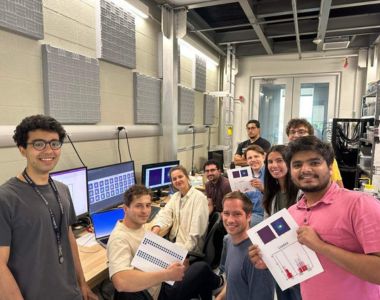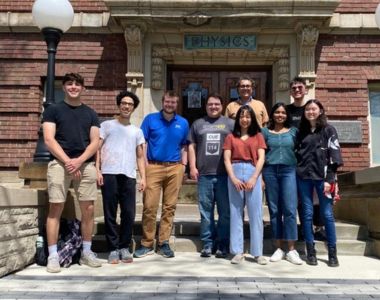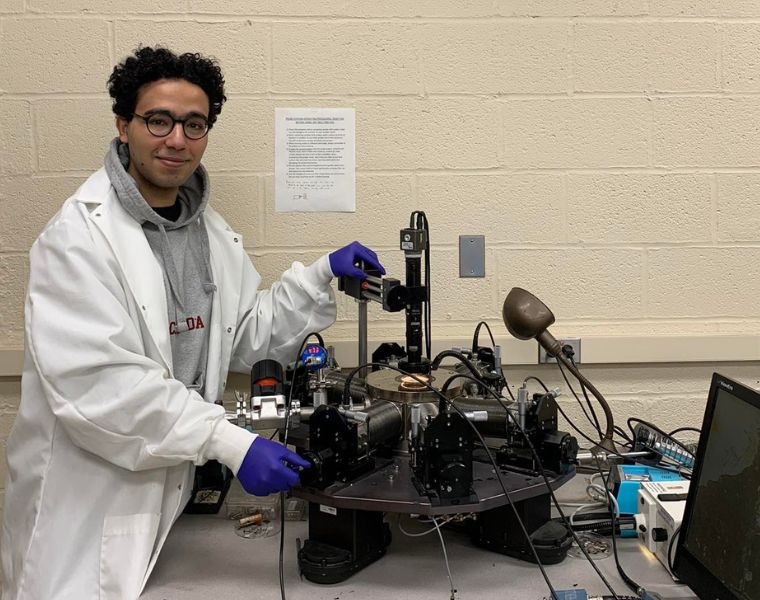Case Western Reserve University’s reputation in applied science spoke for itself when Omar Ali was deciding where to pursue his bachelor’s degree. His decision was cemented when he saw a video about Professor Dustin Tyler’s revolutionary work restoring the sense of touch to people who experience paralysis or have had amputations.
“[I noticed the] strong tradition of innovation,” Ali said, “and I wanted to be a part of that.”
Now a third-year student majoring in physics and electrical engineering, Ali was up for the challenge.
He is a teaching assistant for ENGR 145: Chemistry of Materials, the course he considers to have been the most difficult he took during his first year at CWRU.
“I was stretched, but this was meaningful as I learned quite a lot about the science behind different physical properties of materials,” Ali said. “I wanted to be a part of this significant experience of students navigating their interest through the diverse set of topics we cover.”
He has worked on several research projects, including those related to physically informed machine learning, atomic physics and investigating 2D materials. In addition to conducting research, Ali actively promotes work by others as a member of the editorial board of Discussions, the undergraduate research journal at CWRU.
Learn more about Ali’s experiences at CWRU.
Answers have been lightly edited for clarity and length.
1. What inspired you to pursue your areas of study?

I was interested in the question of how one can make more powerful computers, and electrical engineering was a natural candidate. I took introductory courses and started learning more about the physics department. It was quite appealing to see the rich history of the department, and the big questions that our faculty address in diverse areas, and I eventually became a physics student. While I can talk about being intrigued by the physics itself, this is an incomplete story. Being fascinated by physical phenomena means that one merely likes physics, which I knew earlier from high school. For me, the gap between liking physics and pursuing physics was bridged by our physics department. Throughout my time at the department, I have found knowledge, mentorship and company from faculty and peers. I find a lot of meaning and take great pride in being a part of the long-standing tradition of learning about how things work that our department holds strong
I still pursued electrical engineering, since many of the outstanding scientific challenges that intrigued me had deep technological implications. My engineering coursework has provided me with a number of analytical tools that are of great practical value, and a deeper appreciation of the implications of what I do, particularly in the context of solid-state technology. In fact, it was Dr. Zorman’s class that initiated my interest in semiconductor physics. You should check out Discussions’s Faculty Interview with Dr. Zorman that we conducted for the most recent issue (spring 2023).
2. Can you tell me a bit about your experience as a TA?
It’s most interesting to decide how to give the most value to students during their times in the recitation to add to what they get from the lecture. In my first semester as a teaching assistant, my recitations were lecture-based, which worked fine. However, the instructor in my second semester as a TA believed that this approach was not optimal—and he was right. The sections were transformed into complete problem-based sessions, where the students work their way through the problems the instructor tailored, and we solve them together.
In the third semester, we did more qualitative content, so I followed a hybrid approach, where I guide my recitation through conceptual questions, and they volunteer to answer these questions and discuss, and then I explain things further. I was particularly proud of the ability of many of the students to go beyond their comfort zone and make mistakes and learn from them, and I am glad that so many have found the sessions helpful.
3. Can you tell me about your own research experiences?
I am grateful for meeting some of the most brilliant and friendly people who have unconditionally shown support and compassion for me. This happened first as a member of Dr. Guisspe Strangi’s group that welcomed me during my first year. I worked alongside graduate student Dr. Andy Lininger, who was already working with machine learning. Our common interest was physically informed machine learning, where we seek strategies that enforce the physical laws that we know to optimize photonic devices design.

Later, I was fortunate to learn about the world of atomic physics in Dr. Alexandre Cooper-Roy’s group at the University of Waterloo in Canada, where I specifically worked with the physics and holographic algorithms behind optical tweezers for trapping single atoms. These traps are a part of a quantum computer that is engineered to simulate the dynamics of quantum materials, materials that exhibit striking properties of great fundamental and technological interest.
I wanted to follow up on my emergent interest in quantum matter, and to have long-term experience in condensed-matter physics, so I started working last semester in Dr. Xuan Gao’s lab, a group that investigates experimentally a class of these materials. I investigate the electrical behavior of 2D materials, which is a class of materials that could be exfoliated to the extent of being atomically-thin, using scotch tape. These materials do not only host interesting physics, but can have profound impact on solid-state technology through allowing us to fabricate better transistors. I am quite grateful for all of these great mentors who have shaped a great deal of my identity, and have supported me inside and outside of the lab.
5.What do you hope to do after you graduate?
I hope to pursue a graduate degree in condensed matter or atomic physics, with aspirations for a career in teaching. I am still navigating which questions align best with my interests and abilities, but there are many resources that are available to help me in these decisions thanks to the strong presence of many great educators and mentors in my life since day one at CWRU.
6. Are there any lessons that you have learned from your experiences ?
I would say that there are many great opportunities, but one must take initiative, allocate the resources, and be specific and ask the important questions regarding any future pursuit, in relation to its significance and how it shapes one’s future.

